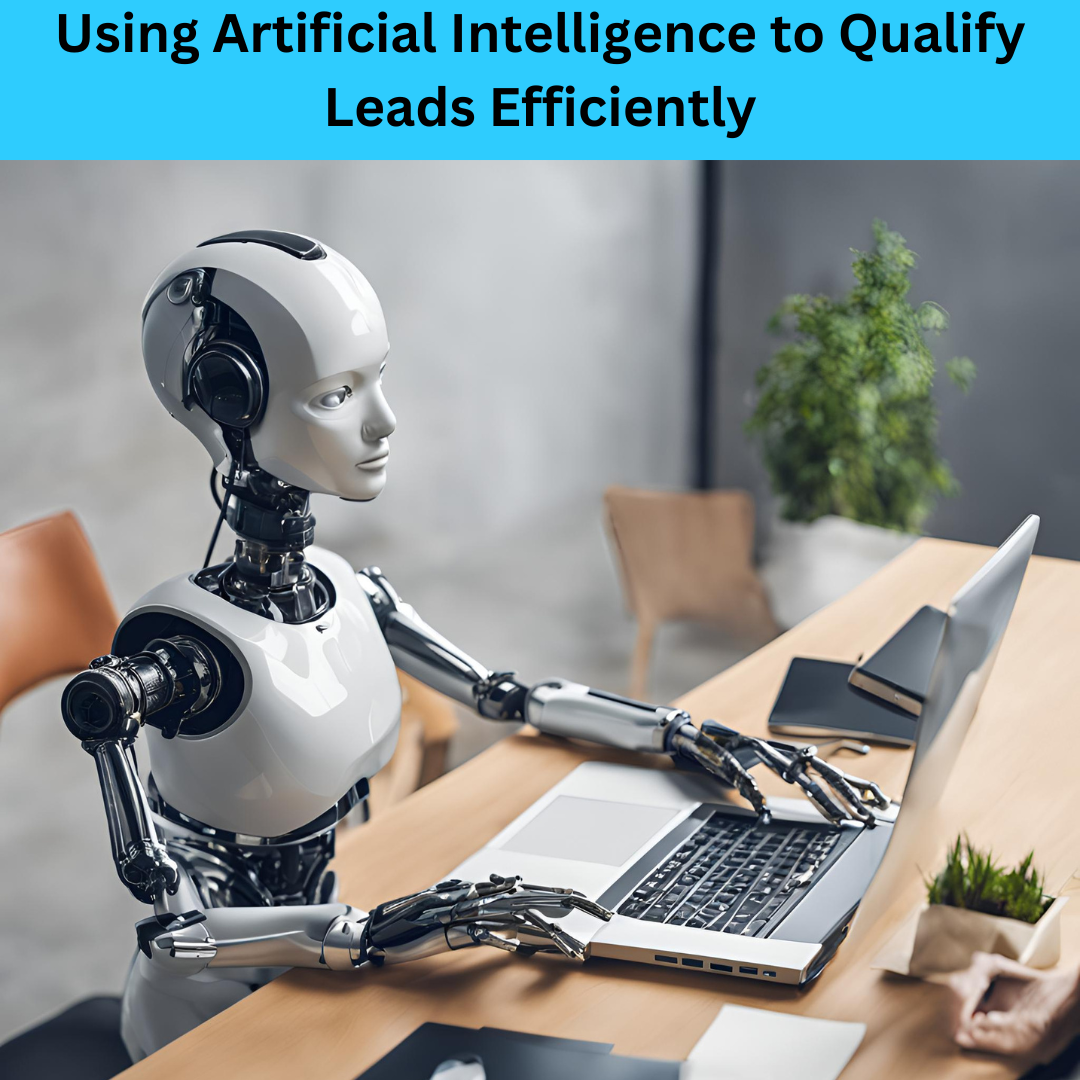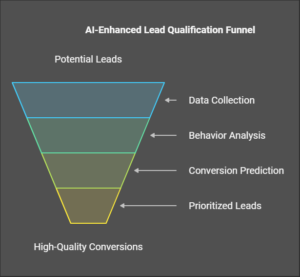
The Imperative for Efficient Lead Qualification
One of the most crucial stages of selling is lead qualification. It makes sure that, in a timely and resource-efficient manner, sales teams focus their efforts on converting prospects who are most likely to be converted. A traditional lead qualification process uses manual processes that are so time-consuming and prone to errors. Artificial Intelligence provides businesses with an opportunity to automate and streamline lead qualification to make it more precise and effective.
AI-powered tools can analyze large volumes of data, assess lead behavior, and predict which leads are most likely to convert. This allows the sales teams to prioritize quality leads and improve conversion rates. With AI, businesses can gain deeper insights into customer intent, behavior, and engagement. In this article, we are going to explore how AI can be used to qualify leads efficiently and what tools can help make the process even better for businesses to maximize their lead-generation efforts.
What is Lead Qualification and Why It Matters
Lead qualification is the process through which it is determined which leads are worth following and based on specific criteria that indicate a high probability of conversion. Traditional methods, most often, rely on manual input and subjective decision-making that can lead to inefficiencies and missed opportunities. Proper lead qualification prevents wasted time by sales teams and focuses on leads likely to become customers.
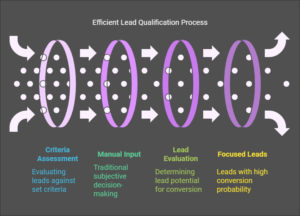
This impacts sales efficiency and revenue growth, hence it depends on lead qualification. Therefore, the absence of an apparent systematic approach to qualification will end up wasting great resources in businesses. The power of AI is a perfect fit here. With AI, objective data can be presented and insights delivered in a more efficient way for faster and more accurate high-value lead identification. Through automation, companies increase the chance of converting prospects into paying customers while becoming more efficient.
How AI Can Improve Lead Qualification
The automation of data analysis and provision of insights that human sales representatives can miss is what enhances lead qualification through AI. With AI tools, an incredible amount of data may be analyzed from a source: social media, website activity, emails, or a CRM system to highlight certain patterns and behaviors with the potential for high chances of conversion. For example, AI can track how often a lead interacts with your content or how long they stay on a particular product page, and use that information to determine their level of interest.
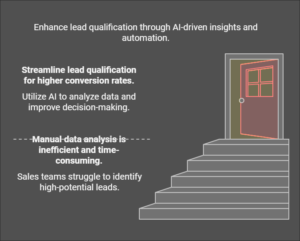
With the use of machine learning algorithms, it is also possible to segment leads according to their behavior and interaction. This will help sales teams target the right leads using personalized outreach strategies. In addition, AI can predict future actions, like a lead making a purchase, by analyzing past behavior and other relevant data. Using AI in the qualification of leads, businesses will get faster and more accurate qualifications and, therefore, enhance their overall sales performance.
AI Lead Qualification Tools
There are many AI-powered tools that can help qualify leads, and each has unique features to help businesses understand and prioritize leads. For example, HubSpot’s AI-powered CRM tracks lead engagement and automatically scores leads based on how likely they are to convert. The platform uses predictive analytics to determine the quality of leads and helps sales teams focus on the highest-value prospects.
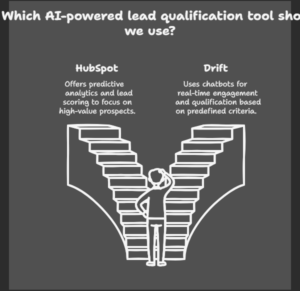
Drift is an AI-powered marketing tool that uses chatbots to engage with leads real-time and qualify them to fit predefined criteria. Website visitors can be engaged such that qualifying questions, as simple as budget or timelines, can be asked as to whether the lead needs to be pursued.
In addition, Salesforce Einstein, an AI-driven tool integrated into Salesforce, utilizes machine learning algorithms to analyze historical data and predict the likelihood of a lead converting into a customer. Such tools help streamline the qualification process by automating tasks that would otherwise require manual intervention, saving time and improving efficiency.
Predictive Analytics in Lead Qualification
Predictive analytics is the most important use case for AI in lead qualification, as it uses analysis of historical data and extraction of patterns to predict what leads are likely to close as paying customers. Such an approach relies on algorithms used in machine learning in the assessment of factors related to lead behavior, their engagement with marketing materials, and demographic information.
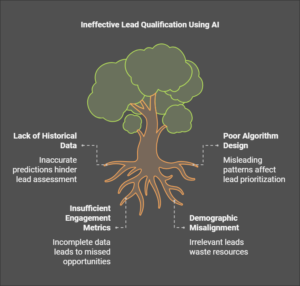
For instance, AI tools predict the possibility of a lead converting to a customer using how often they interact with email campaigns or visit your product pages on your website. Predictive analytics may also classify leads as hot, warm, or cold, thereby enabling sales teams to direct their efforts at the hottest leads that can convert more easily.
Implement predictive analytics with regard to lead qualification to determine priorities regarding resource utilization in contact and engagement with targeted leads at the right point of time, thus improving sales efficiency and closing rate.
Artificial Intelligence and Lead Scoring: The Automation Process
Lead scoring is the process of assigning a numerical value to a lead based on their behavior and fit with your business. Traditionally, lead scoring was done manually, and sales and marketing teams used to evaluate leads based on a set of criteria. However, AI has led to the automation of the process and made it much more accurate.
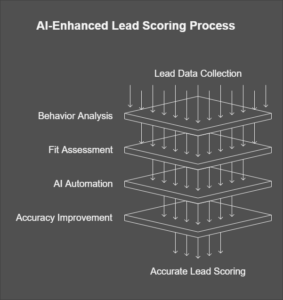
This data comes in through various multi-touchpoint touchpoints email interaction, social media activity, website views, or previous purchase records. In determining this data, it will score all leads against its models as per every possible parameter more relevant being higher-ranked. Additionally, AI technology can always learn and re-tune its scoring model according to the latest discovered data or trends, providing a far more dynamic yet accurate system in the passage of time.
This automation reduces the reliance on manual effort, minimizes human error, and ensures that sales teams are always working with the most up-to-date information. By automating lead scoring with AI, businesses can improve the efficiency of their sales processes and boost conversion rates.
Enhancing Customer Experience through AI-Driven Lead Qualification
AI doesn’t just help businesses qualify leads efficiently; it also plays a crucial role in enhancing the customer experience. Through AI-powered tools like chatbots and virtual assistants, businesses can engage leads in real time, providing immediate responses to inquiries and guiding them through the sales process. This instant engagement improves customer satisfaction and helps nurture leads more effectively.
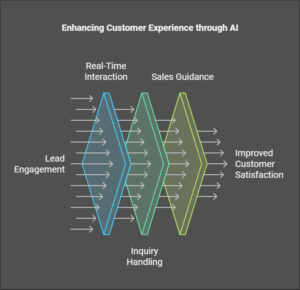
This interaction can be personalized by tailoring content and messaging based on lead behavior and preferences using AI. For example, when a lead has been visiting specific products on your website, AI tools may bring up offers or product recommendations that are relevant to what they have been viewing, which increases the probability of conversion.
Moreover, by automating the qualification process, AI frees up sales teams to focus on high-value leads and personalized outreach, further improving the customer experience and helping businesses build stronger relationships with their prospects.
Overcoming Challenges in AI-Powered Lead Qualification
However, businesses can still experience some implementation challenges when using AI for lead qualification. One common challenge is data quality. The effectiveness of AI tools depends on the accuracy and completeness of the data that will be used to make predictions about leads. Poor-quality data can result in low-quality lead scoring or even missed opportunities.
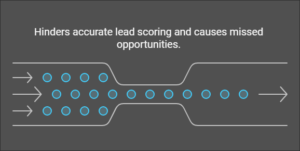
In summary, another challenge lies in its integration with already existing systems. Businesses should ensure CRM, marketing automation, etc., work together in alignment with AI-based lead qualification systems. Such an engagement requires technical acumen at times and some major revamping of present workflows.
Lastly, there may be resistance from sales teams who are accustomed to traditional methods of lead qualification. To overcome this, businesses need to invest in training and ensure that sales teams understand the value and potential of AI tools.
By addressing these challenges, businesses can successfully integrate AI into their lead qualification processes and reap the benefits of more efficient and accurate lead management.
Measuring the Impact of AI on Lead Qualification Efficiency
The impact of AI on lead qualification efficiency can be measured through several KPIs. The conversion rate is one of the most important KPIs as it tracks how many qualified leads actually become paying customers. Comparing the conversion rates before and after AI implementation will give an assessment of the effectiveness of an AI-driven lead qualification process.
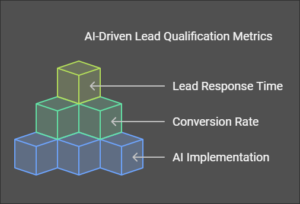
Lead response time is another key performance indicator. It refers to how quickly the sales team reacts to qualified leads. Now that AI tools qualify prospects automatically, response times significantly drop, which brings quick follow-up and high probabilities of conversion.
The other metric that is used includes lead quality where AI aids the sales team in only concentrating on converting those leads. The system of the business can gauge the efficacy of the leads the system produces by using lead-quality tracking.
Conclusion
AI-powered lead qualification is transforming the way businesses generate and manage leads. By automating the qualification process, businesses can save time, increase efficiency, and focus their resources on high-quality leads that are more likely to convert. With predictive analytics, lead scoring, and real-time engagement tools, AI enhances the accuracy of lead qualification, helping businesses prioritize leads and tailor their outreach strategies.
More future promises hold in AI qualifications of leads as natural language processing, machine learning, and automation are further applied to increase efficiency. So, if a business harnesses such AI technology for its activities, it has a bright future ahead at outgunning the rest of the competition and converting maximum leads, thereby growing up.
This means embracing AI in lead qualification no longer is a luxury, but rather a necessity in keeping up with the competitiveness and maximizing lead generation for any business.
